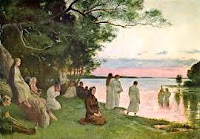In Genesis 1:2, we read that at Creation, there is a description of a "Mighty Wind," which is a the word also used for the "Spirit of God", resting on the surface of the oceans, before anything else is formed. So we can see this as a way that God communicated with his creation, and continues to communicate with His people through His Spirit. Like the wind or breath we cannot see what is producing the effects that we can see. God is also shown as bringing life into Adam with something unique: His Breath/Spirit.
The words of God that came to the people for whom that God had something specific and special, are said to have come through the Spirit. One of the differences between this relationship and what ancient pagan peoples had with their "gods" is that the Hebrews' God and His Spirit could not be seen physically, and the people are told to not even try to represent Him in any physical way. We see that Noah had enough faith in the Words of God to spend a century building a boat, and Abram/Abraham to move his family and clan hundreds of miles in response. One of the few times that the Spirit is visible is when the Ark of the Covenant is brought into the just-built Temple of Solomon: When the priests came forth from the holy place... in unison when the trumpeters and the singers were to make themselves heard with one voice to praise and to glorify the Lord, and when they lifted up their voice accompanied by trumpets and cymbals and instruments of music, and when they praised the Lord saying, “He indeed is good for His lovingkindness is everlasting,” then the house, the house of the Lord, was filled with a cloud, so that the priests could not stand to minister because of the cloud, for the glory of the Lord filled the house of God. (1)
We find the same metaphor--the Spirit bringing the Glory of God--when the prophet Ezekiel saw what he described as "the appearance of the likeness of the glory of the Lord. So when I saw it, I fell on my face, and I heard a voice of One speaking. And He said to me, “Son of man, stand on your feet, and I will speak to you.” Then the Spirit entered me when He spoke to me, and set me on my feet; and I heard Him who spoke to me. And He said to me: “Son of man, I am sending you to the children of Israel, to a rebellious nation that has rebelled against Me; they and their fathers have transgressed against Me to this very day. (Ezekiel 1:28-2:3) Then the glory of the Lord departed from over the threshold of the temple and stopped above the cherubim. (Ezek 10:18) And when Ezekiel had a vision of the Temple rebuilt, he had another vision: The glory of the Lord entered the Temple through the gate facing east. Then the Spirit lifted me up and brought me into the inner court, and the glory of the Lord filled the Temple. (Ezek 43:4-5)
We find the Spirit of the Lord in a prophecy given through Isaiah that tells of the Spirit in terms that we recognize, especially at this time of year: There shall come forth a rod from the stem of Jesse, and a Branch shall grow out of his roots. The Spirit of the Lord shall rest upon Him, the Spirit of wisdom and understanding, the Spirit of counsel and might, the Spirit of knowledge and of the fear of the Lord. (2) We see the fulfillment of this promise in the coming of Jesus, as told by an angel: “Joseph, son of David, do not be afraid to take to you Mary your wife, for that which is conceived in her is of the Holy Spirit. And she will bring forth a Son, and you shall call His name Jesus, for He will save His people from their sins.”(3)
We see the Holy Spirit working closely with Jesus, throughout His ministry on Earth. As He was preparing to return to His Father, He tells His disciples: But you shall receive power when the Holy Spirit has come upon you; and you shall be witnesses to Me in Jerusalem, and in all Judea and Samaria, and to the end of the earth.”(5)From this point, the Holy Spirit works to grow the Church, inspire the apostles and missionaries, and be the source of power for all of us who accept Him in our lives, accept His Gifts, and show His Fruits.
1.(2 Chronicles 5:11-14 ).2. (Isaiah 11:1-2) 3. (Matthew 1:20-22) 4. (Matthew 3:13-17) 5.(Acts 1:8)


